Days
of Heaven
1978
Director: Terrence Malick
Starring: Richard Gere, Brooke Adams,
Linda Manz, Sam Shepard
Does
anyone out there know what caused Malick to come out of hibernation, as it
were? For ages, it was looking like Badlands
and Days
of Heaven were his only two feature films, then people started peeing
with excitement over his Thin Red Line, made two decades
after Days of Heaven. And now,
with three films in post-production, he’s practically on a one-film-a-year
schedule. Bizarre.
Days
of Heaven,
the film he made before dropping off the face of the cinematic world for twenty
years, is a lyric study of a fairly simple love story. Bill (Gere), whose name is only mentioned
once in the movie, is laboring in Chicago’s steel factories in the 1910s. After an accident with his boss, he takes his
girlfriend (Adams) and his younger sister (Manz) on the run out to northern
Texas where they join other migrant workers.
Hired by a wealthy young farmer (Shepard) to help with the year’s wheat
harvest, Bill tells everyone that his girlfriend is actually his sister; when
he sees the rich farmer making eyes at his lover, Bill concocts a plan. Finding out that the farmer is terminally
ill, he pushes his girlfriend to reciprocate the farmer’s advances so they may
stake a claim to his fortune. How could
such a well thought out plan go wrong?
You’re smart, dear reader, I’m sure you can imagine how this ends.
Don’t
tune in to Days of Heaven for the sad love story. Dialogue is sparse at best, and it becomes
abundantly clear early on that the narrative is not the focus. No, Days of Heaven is a Landscape
Movie. This is all about Malick
photographing the American Midwest and the flora and fauna of northern
Texas. Where I think Days
of Heaven works better than an average Landscape Movie is how Malick
uses the natural scenery he’s shooting as symbolic of the emotions of the
central love story. In the opening
sequence, where we see Bill’s accident with his boss at the steel factory, we
hear virtually no dialogue. You see Bill
and the man shouting at one another, but they are drowned out by the
ridiculously loud machinery clanging in background. There is fire and roaring and metal, and it’s
angry and aggressive and dangerous. It
matches Bill’s emotions, then. When we
move the action out to north Texas, there is lightness and happiness in the
images we see, as Bill feels he has escaped a bad situation. When things get complicated between his
girlfriend and the farmer, we enter winter scenes in the film. There is cold and snow and ice. When the farmer begins to suspect that Bill
is not the girl’s brother at all, there is the climactic locust and fire
sequence, fraught with danger and the same aggression we saw at the beginning
of the film. I like the artistry in Days
of Heaven because it underlines the love story very well. I don’t feel as though Malick is showing me
pictures of pheasants “just cuz,” but to make a point, to show me something
about the story. I read an
interpretation of Days of Heaven that aligned each of the four main characters
with Earth (the Linda Manz character, always playing in the dirt), Air (the
farmer, puttering around with his weathervane), Water (Brooke Adams’ girlfriend,
first seen wading by a river), and Fire (Bill, working in the fiery steel
factory). It’s a very interesting interpretation,
and one that works for me.
Days
of Heaven
was scored by Ennio Morricone. I’m very
hit or miss when it comes to Morricone.
I know he’s apparently some movie scoring deity to most everyone, but
not to me. His score here is less a
score and more endless adaptations of Saint-Saëns’ “Aquarium” from Saint-Saëns’
iconic “Carnival of the Animals.” While
“The Swan” is the most famous piece from “Carnival of the Animals” (and
possibly the most famous work by Saint-Saëns full stop), I’ve always enjoyed
“The Aquarium” more as it’s even more evocative to me than its more famous
counterpart. There’s a distinct
other-worldliness to “The Aquarium,” a slight sense of dissonance, of unease,
and it works perfectly in Days of Heaven in establishing
tone. Frankly, I think Morricone did the
right thing by essentially taking a cue from “The Aquarium” and scoring the
film as variations on this one piece of classical music. It does undercut Morricone’s job as a composer
(because he’s really just adapting Saint-Saëns here, not exactly writing
anything new, per se) but it works. It’s
a smart choice.
I
also like Linda Manz in this film, both her character and her narration. Actually 16 when she filmed this, she’s meant
to play a younger character, more like 12 or 13. Manz gives a hard edge to her character
without making her too grown up. She is
still innocent in some respects, but also very clear-sighted when it comes to
the people and the world around her. Her
character wouldn’t hesitate punching out most obnoxious movie children characters,
but I think she’d manage to pull off that sort of violence in an endearing
way. I enjoy the character’s
straightforward optimism. She doesn’t
yearn for a brighter tomorrow, but she accepts her lot for what it is with
clear eyes and a vision of how to make it the best possible reality, and yet
she isn’t a Pollyanna. Honestly, she
felt the most fleshed out of all the characters in the film.
Despite
the very pretty pictures, I found Days of Heaven significantly less
potent in this, my second time seeing it on the big screen. When I originally saw Days of Heaven at the
Dryden about four years ago, I thought it very powerful indeed. I was enraptured by the dangerous love story
and the gorgeous images. I was looking
forward to seeing it at the Dryden again.
Much to my dismay, however, it did not stand up nearly as well on this,
a repeat viewing. I wasn’t nearly as
emotionally invested in my second go around.
It felt weaker, less magical, with very pretty pictures but caricatures
acting instead of fully formed characters.
I couldn’t help but feel disappointed.
So it’s difficult for me to come down with a final judgment on Days
of Heaven. While never a perfect
10 for me to begin with, it’s an odd example of a repeat viewing actually
hurting a film for me when it usually serves to improve my opinion.
And
really, that’s where I ultimately make a decision about Days of Heaven. It’s very nice to look at, but it feels a bit
empty, which is really surprising given Malick’s reputation for profundity. It did not bear up well on a second
go-around, and I’m the sort who loves to watch movies multiple times.
Arbitrary
Rating: 7/10
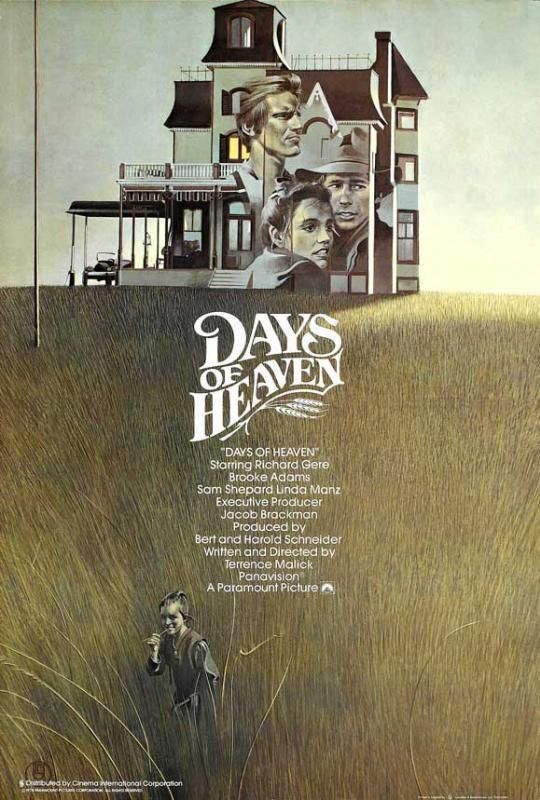
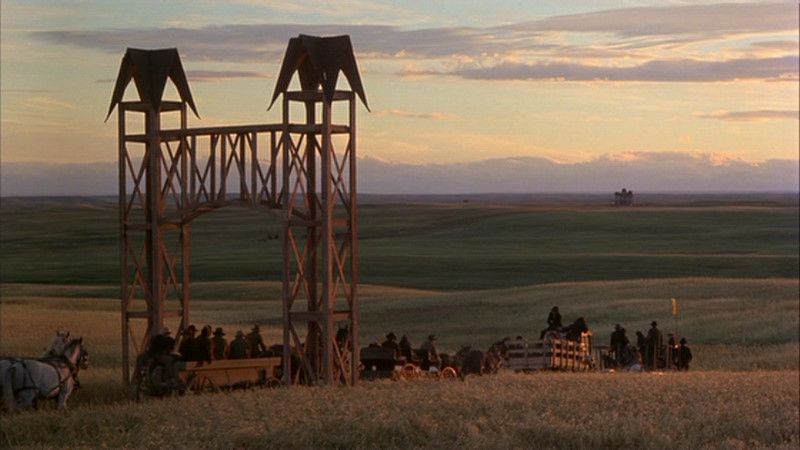
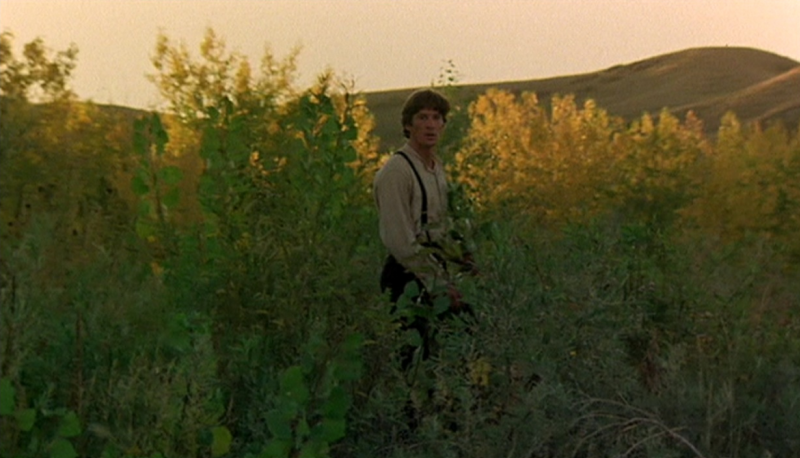
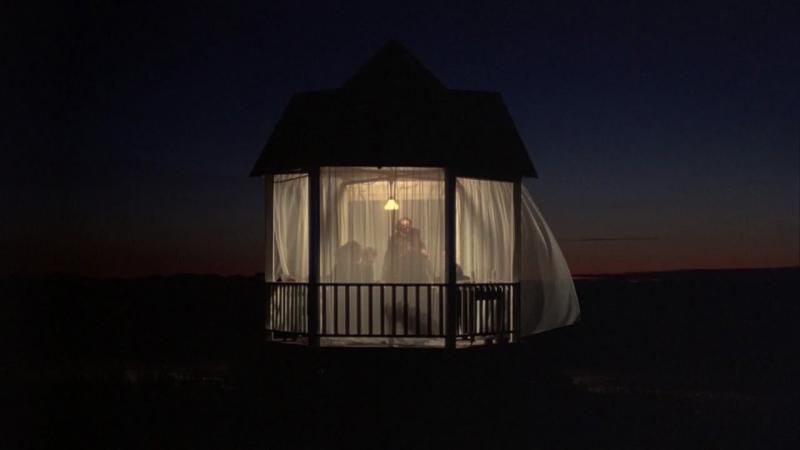
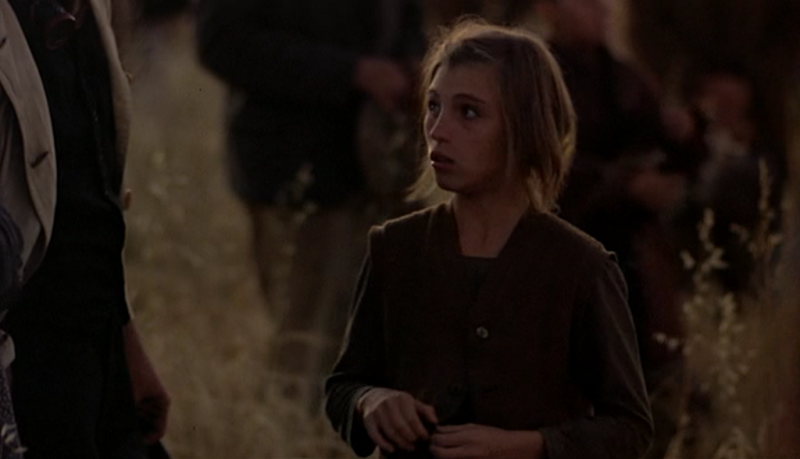
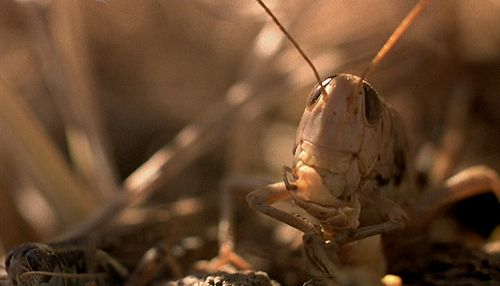
"It’s very nice to look at, but it feels a bit empty"
ReplyDeleteThat's a description of pretty much every film Malick has ever made.
"Malick’s reputation for profundity"
Yes, some professional reviewers like to wax rhapsodic about the inner meanings of his films, but this is completely their inventions to try to explain why a movie like The Tree of Life has 20 minutes of plot stretched over 2 hours and 20 minutes of screen time - and has a 50 minute long-form music video at the start of it. Malick is concerned with the pretty pictures, not with any kind of coherent or profound message. That's best illustrated by the fact that he almost never has a screenplay for the films he makes. He just shoots stuff as he goes along and tries to assemble it into a movie afterwards.
Having said all of that, Days of Heaven is the one film of his that I would recommend to others. It is short enough that the lack of plot and focus common to all of his films does not get a chance to start wearing on the viewer who has been sitting around waiting for something to happen. Enough does happen in this (although none of it really a surprise, as you pointed out) to keep a viewer engaged for an hour and a half.
Of Malick's work, I've only seen Badlands and this. The Dryden is doing a Malick series, so I'll be catching Thin Red Line and Tree of Life on the big screen in the next few weeks. I'm... a little nervous. As I said, I really enjoyed this movie the first time I saw it, but not as much this second time around, which makes me wary of his upcoming work.
DeleteOh well, pretty pictures are something, right?
And, as you say, I'd recommend Days of Heaven as well. It's such a brisk running time that, as you say, it never really gets weary or bogged down. Why do people feel the need to make uber-long movies that don't NEED to be uber-long? If you don't have enough story for two hours, THEN DON'T MAKE IT TWO HOURS!!!!
I saw Badlands after Days of Heaven. It felt like it was almost the same story and that Malick did Days of Heaven to "get right" the things he felt didn't work on Badlands.
DeleteThe Thin Red Line kept my interest for the first hour, but by then I had seen enough shots of wind blowing trees around and wanted the movie to go on to something else, like maybe the war that was going on.
The Tree of Life seems to be love/hate for people. Some consider it the best movie ever made, while others consider it 2 1/2 hours of directorial masturbation. I'm in the middle. I would have given the Oscar to this film for cinematorgraphy, but great cinematography and nothing else does not a movie make (in my mind). It's a collection of pretty images in search of enough plot to fill its running time. The first time I checked the time I was 17 minutes in. The second time was 21 minutes in. The third time was 28 minutes in and I swore I would not check the time again until at least an hour had gone by. I made it to 52 minutes, mostly because that was around when the music video opening ended. Having said all this, before I returned the film I watched about 10 minutes of the music video again because of the pretty images in it.
There are parts of Badlands I like, and parts I really love, but I agree that as a whole, it's not as effective as Days of Heaven.
Delete"wanted the movie to go on to something else, like maybe the war that was going on."
Oh... yay... Thin Red Line is tomorrow night at the Dryden. I am planning on caffing up beforehand in order to make it through.
And your description of Tree of Life had me laughing. well done!
I'm following your lead on this one--I haven't watched this yet, so I read your first and final paragraphs only. This is one I'm really looking forward to seeing. I'm still hopeful, but I'm a little more guarded now.
ReplyDeleteI really enjoyed this movie the first time I saw it. Second time, not so much. Read that as you will - it's definitely worth seeing, as it's just plain gorgeous, and I think you should still be looking forward to it.
DeleteSeeing it on the big screen was pretty rockin', I must add. This is a visual dream, if nothing else.